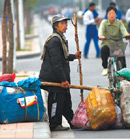Top Biz News
Experts call for revisions of CPI
(Xinhua)
Updated: 2010-01-22 13:37
 |
Large Medium Small |
Liu Qi, an advertising firm employee in Beijing for eight years, Thursday spent 80 yuan ($11.7) at a supermarket. About a half went on food and the rest on other daily necessities.
However, the biggest financial pressure for the 29-year-old is not food, but her plan to buy an apartment in the city as home prices had risen through the roof.
China's Consumer Price Index (CPI), the main inflation gauge, climbed 1.9 percent year-on-year in December, mainly boosted by food, rent and related prices, Ma Jiantang, director of the National Bureau of Statistics (NBS), said Thursday.
The CPI in November and December was lifed by rising consumption on the back of faster economic expansion, and food price hikes caused by winter weather, said Xiong Peng, a senior researcher with Shanghai-based Bank of Communications (BOC), China's fifth largest lender, Thursday.
A BOC report out Thursday predicted year-on-year CPI growth might stand between 3 percent and 4 percent in 2010.
"I have felt vegetable, egg and meat prices rise quickly after heavy storms and temperature drops in Beijing and neighboring provinces. But my food bill is still around 1,200 yuan per month. I don't have plans to curtail my food shopping list," Liu said.
Vegetable prices surged 16.4 percent in December from the previous month, Ma said, without specifying figures.
Another 1,300 yuan of Liu's income went on rent for her bedsit, power, water and maintenancee bills, accounting for more than a fifth of her monthly income.
"I spend about 1,000 yuan to party or dine out with friends, another 500 yuan on clothing and 200 on my cellphone credit each month. Most of my colleagues and classmates have similar situations. I can't save much. Buying a home is an unrealistic goal for me now, and to rent a bigger apartment is a luxury I can't afford," Liu said.
Second-hand home prices jumped about 43 percent near the southern Second Ring Road in Beijing last year where Liu lives, and apartment rents increased about 5 percent on average in this area, said Qin Rui, a senior analyst with Beijing-based 5i5j Real Estate Service.
The government has taken a series of tax, land and monetary measures in recent months to cool the property market, which has soared since February 2009 to much public complaint.
"I heard the inflation ratio was insignificantly bigger in November. I got a slightly bigger paycheck this year, but my income rise lagged behind home price and rental spikes," Liu said.
China's CPI fell 0.7 percent year on year in 2009. The CPI was up again in November by 0.6 percent from a year earlier, according to the NBS.
Real-time Picture
The CPI was an important economic gauge, but it needed frequent modification in line with actual conditions to give a clearer and real-time picture of general living costs and financial pressures, said Ou Minggang, director of the international finance department of the Beijing-based China Foreign Affairs University.
"People's eating and consumption habits have changed greatly in recent years. Housing costs also occupy an increasingly bigger share of incomes, so corresponding modifications are necessary, as policy-makers will read CPI and other metrics for judging economic performance," Ou said.
The NBS raised the weight of rent, water, electricity and maintenance costs in the CPI basket from 9.7 percent in 2000 to 13.2 percent in 2006 as the rents rose.
"The NBS has made some minor modifications, and the weight now is around 13.6 percent," Xiong said.
China's CPI basket includes seven other types of commodities: food; alcohol and cigarettes; clothing; home appliances and maintenance; medical care; transport and communication; education and entertainment.
Home purchase costs were excluded from the CPI calculation and food still accounted for the biggest proportion, said Ge Zhaoqiang, vice general manager of strategy and development department at China Merchants Bank.
| ||||
"As a third of the CPI basket, rising food prices might easily stoke inflation forecasts. The food weight in the CPI is too high, " said Ge.
Food prices rose 5.3 percent in December from a year earlier nationwide, pushing up the CPI by 1.74 percentage points, while rental and related bills edged up 1.5 percent, pushing up the monthly CPI by 0.21 percentage points, NBS figures showed.
The government should also closely monitor property prices and bank credit to avoid bad inflation from affecting people's lives, Ou said.
"Inflation risk looms large and policy-makers should take timely steps to curb a rapid CPI spike and better regulate the property market so people can live more comfortably and affordably," Xiong said.













